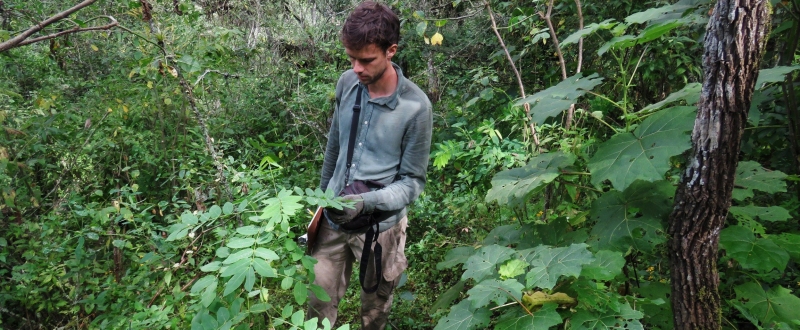BY TOBIAS FREMOUT. The international demand for sustainable chocolate is strongly increasing. Farmers in Peru, the biggest producer of organic cacao worldwide, have taken note. This year, I will work together with the Peruvian UNTRM university, the Belgian NGO Rikolto and APPCACAO, a local NGO that unites cacao farmer cooperatives, to develop new strategies to increase the environmental and economical sustainability of cacao plantations in Peru.
Shifting to an agroforestry system
To deliver sustainable cacao, Peruvian cacao farmers are increasingly shifting away from monocultures to agroforestry systems, in which cacao trees are cultivated under the shade of other, larger tree species, often along with other crops. This contributes to local income generation and diversification. Agroforestry systems also contribute to biodiversity and climate change mitigation: they provide habitats for local fauna and flora and can store much more carbon than cacao monocultures.
Choosing the right combination of tree species for the right place is not an easy task. In Peru, the number of species to choose from is enormous. Many things need to be taken into account , such as the delivery of timber and non-timber forest products, the effect of tree species on soil fertility, or their interaction with the cacao plants. A bad combination of tree species can negatively affect farmers’ income for decades. To make it easier to decide which combination works best, we aim to develop an online tool that can help select tree species in cacao agroforestry systems.
Collaborating with NGOs
Our project goes beyond pure academia: it aims to provide a practical solution for a specific problem. Rikolto encountered this problem in their efforts to promote cacao agroforestry systems in Peru, and I joined them to further develop their idea to overcome it. Collaborating with an NGO as a researcher provides you with an interesting perspective, since they are very well connected with the reality and problems on the ground. Thanks to such collaborations, I realised that there is often a large gap between research and reality in the field. With some effort from both sides, it is possible to reduce this gap.

In this collaboration, we work together as a team; we are like a puzzle in which all the pieces are important. The participation of the Peruvian NGO APPCACAO is of great significance. In the first phase of the project, we will interview local cacao farmers to gather information on the economic and ecological aspects of different tree species. The help of APPCACAO will be important here, not only for logistic reasons, but also to ensure that the content of the interviews matches the reality on the ground. The organisation will stay involved during the different phases of the project. Especially in the last phase, their feedback will be crucial to ensure that the tool is easy to use and meets the local demands to make better decisions when selecting tree species for cacao agroforestry systems.
Even though I will not be able to travel to Peru myself in the near future, I am confident that this collaboration will be fruitful and interesting for all parties involved. As a researcher, I will learn much from the local university, Rikolto, APPCACAO, and from the farmers themselves. I hope I will succeed in providing them with a useful tool that will help them transition to the more sustainable production of cacao.


